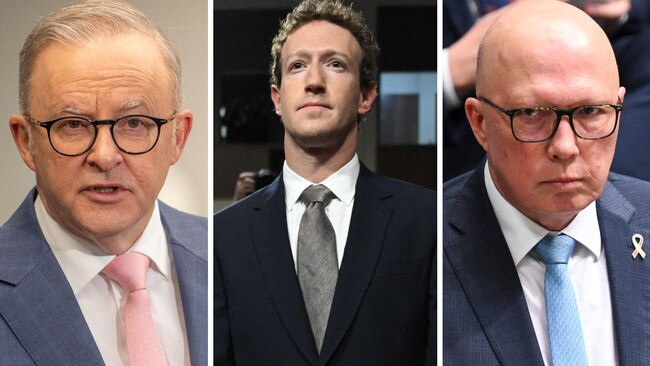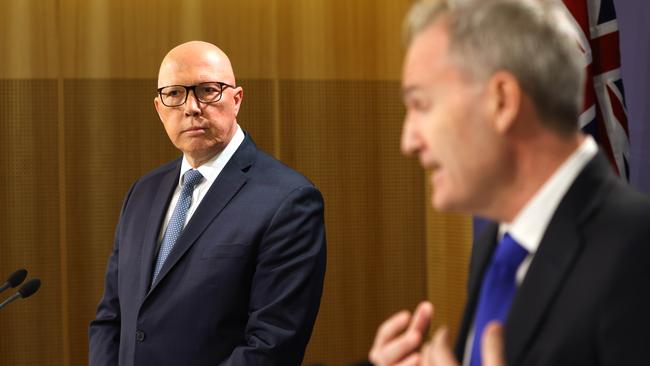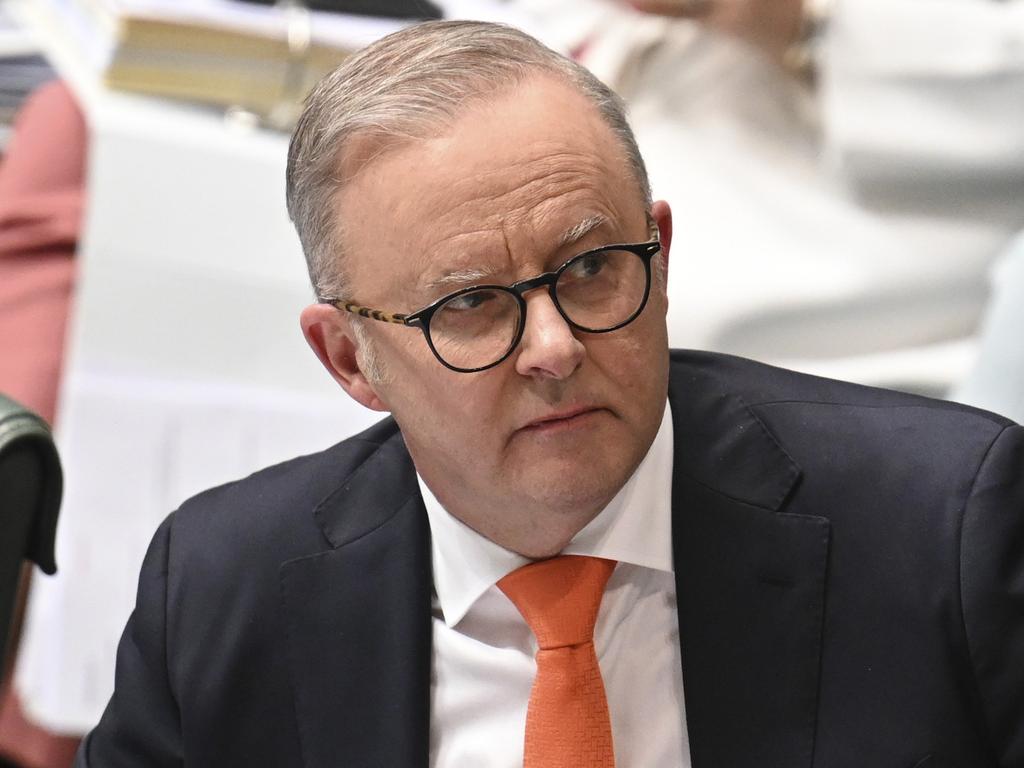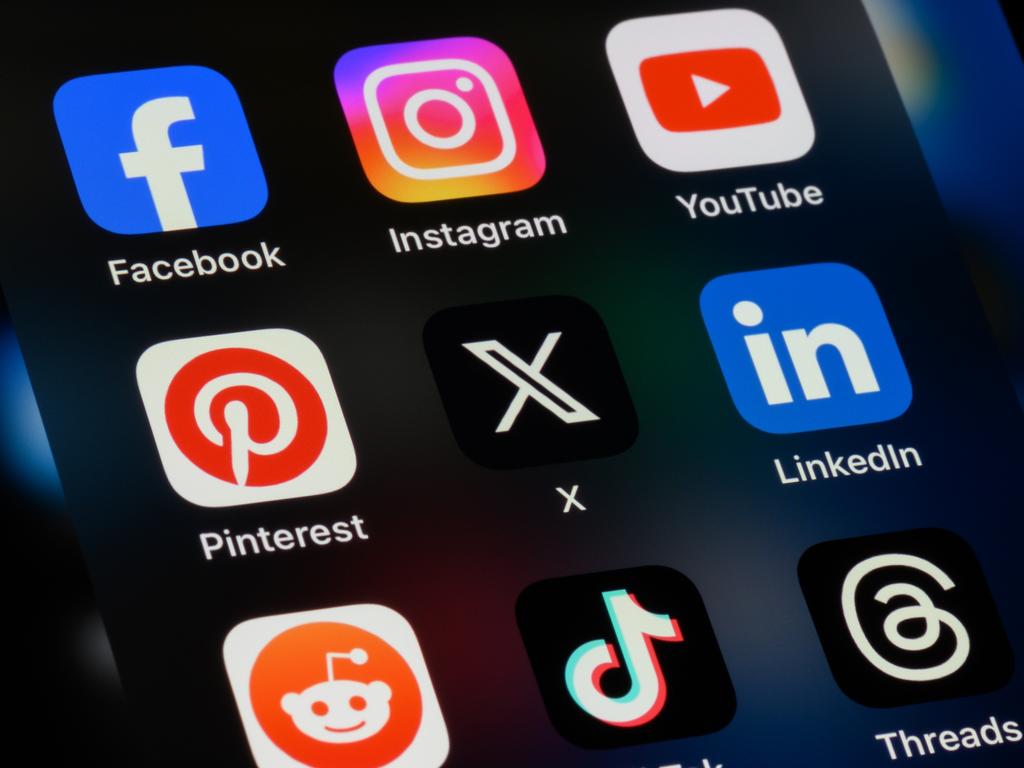Big tech thumbs nose at Anthony Albanese, as social media election fight brews
Anthony Albanese and Peter Dutton are preparing an election showdown to rein in social media giants, as Labor and the Coalition play catch-up on growing public unease over the tech platforms.

Anthony Albanese and Peter Dutton are preparing an election showdown to rein in social media giants, as Labor and the Coalition play catch-up on growing public unease about the impact of tech platforms on children, mental health and democracy.
In a pre-election attack, the Coalition has vowed to take a stronger stand against powerful social media companies, and accused the Albanese government of going easy on Meta and moving too slowly to protect teens from online harm.
Following a flurry of piecemeal social media legislative announcements by the government in parliament last week, Peter Dutton is preparing to ramp up the fight against cashed-up offshore tech giants amid concerns Labor will apply a soft touch ahead of next year’s election.
Senior Labor and Coalition sources have confirmed policies targeting tech giants will be central themes of their election campaigns, in response to a wave of terrifying social impacts raised by parents, teachers, health experts and media organisations.
With content on social media and tech platforms fanning scams, disinformation and misinformation, deepfakes, extremist material, bullying, exploitative algorithms, perverse social behaviours and self-harm, the Prime Minister and Opposition Leader have been told that addressing social media harm is a “top-order issue for voters” alongside cost-of-living pressures.
Despite receiving advice from the Australian Competition & Consumer Commission on “Meta’s bargaining power and use of news content”, the Albanese government has delayed designating the operator of Facebook and Instagram under the news media bargaining code for more than six months. After Mark Zuckerberg’s Meta in March walked away from Josh Frydenberg’s world-first code – cutting hundreds of millions of dollars in funding for Australian news publishers – the government threatened to invoke powers forcing the US-based company to negotiate new deals. Instead of appointing a senior cabinet minister to lead negotiations with Meta, Mr Albanese tapped Assistant Treasurer Stephen Jones to determine the government’s position.
Jim Chalmers has recused himself from the process due to a conflict of interest, as his wife, Laura, is a senior editor at News Corp.
The delay in designating Meta, which would force the company to enter commercial deals with media outlets or face fines of up to 10 per cent of local revenue, comes as Labor considers an option of imposing a levy to compensate news organisations. It has indicated a decision is imminent.
With Meta threatening to ban news in Australia, journalists losing jobs and media companies warning of long-term sustainability pressures, the government is being urged to not back down from forcing the social media giant to re-enter commercial negotiations.
NewsCorp Australia, which publishes The Australian, Nine, Seven and other leading media organisations are resistant to interventionist government-ordered levies or handouts. Media outlets are recommending social media giants be forced to enter commercial negotiations to use content, and pay at least the same rate as previous deals.
NewsCorp’s submission to the parliamentary joint select committee on social media and Australian society calls on the government to designate Meta and make it pay for the news it uses. In addition to designation, NewsCorp is proposing a “social licence” requiring platforms to apply for and pay for a licence to operate here. If a social media giant refuses to apply for a licence, the platform must leave Australia.
NewsCorp’s submission, a 10-minute video titled Time for Change, said a social licence rather than a levy would “force the platforms to take responsibility for the harms they cause”. The annual licence fee could fund programs to address harms suffered by Australians and provide back-up funding for news businesses. A key concern around a government-imposed levy is the undermining of Australia’s global leadership in enforcing the media bargaining code.
Levies, which have been introduced in other jurisdictions including Canada and California, could be manipulated by tech giants in a way where they pay less and do not engage in long-term arrangements using Australian-produced content to train, inform and build their new products.
Google recently announced it would pay just $100m to news organisations under Canada’s levy.
Nine’s submission said “we cannot be scared to designate platforms that refuse to recognise our sovereign laws … Meta’s decision in the middle of last year to remove news content in Canada to avoid that country’s equivalent of designation has resulted in significant economic damage to smaller publishers as well as an increase in dis-and misinformation and fake news on its platforms”.

Opposition communications spokesman David Coleman, who described the government’s suite of social media legislation as “really unfocused and random”, said “sovereignty resides with the people, not the tech platforms”.
Mr Coleman, who is yet to announce whether a Dutton government would designate Meta, said the government was focused on “shallow rhetoric … to grab a few headlines”. “The golden thread that runs through the Albanese government is weakness and inaction. It has been on proud display on this issue. Meta has thumbed its nose at the government, and gotten away with it,” Mr Coleman writes in The Australian.
Amid fears Google could follow the lead of Meta, Communications Minister Michelle Rowland said: “On designation, the government has received advice from the ACCC … and we will have more to say in due course.
“Meta’s decision to walk away from commercial deals for news in Australia undermines our society, our economy and our democracy. As a result of Meta’s decision, a number of Australian news media businesses have since announced cuts to their editorial teams and mastheads. This hurts us all.
“This government expects digital platforms with a substantial bargaining power advantage to continue making a significant contribution to the sustainability of the news sector.”
Asked if she supported a social licence, Ms Rowland said: “There is nothing special about social media companies when it comes to adherence with Australian law … these companies aren’t licensed, in the way that traditional broadcast and telecommunications services are, but they are regulated and have obligations to society.”
With only three joint House of Representatives and Senate sitting weeks remaining this year, the Albanese government is under the pump to pass its raft of social media legislation.
The Australian understands some legislation, which includes a minimum age for access to social media and crackdowns on disinformation/misinformation, doxing and hate speech, could be stalled in parliament if Mr Albanese calls a March election.
Mr Coleman said while he expected Labor would announce its response to Meta before the election, a Dutton government would take strong action, as the Morrison government did with the media bargaining code and Online Safety Act. “I think the Coalition has a very strong record in this area, and Peter Dutton is someone who is not afraid to take on these companies,” he said. “And I think we’ve demonstrated in recent times we’re willing to take tough decisions and take things up to the tech platforms, and we would certainly do that in government.”
After Mr Albanese last week followed the lead of Mr Dutton’s June policy announcement to legislate a minimum age for access to social media and relevant platforms, The Australian understands there are divisions in cabinet ranks over whether the Coalition’s preferred age of 16 should be adopted.
While Mr Albanese is understood to support restricting teens up to 16, some federal Labor MPs are backing banning children under the age of 14, which has been endorsed by South Australian Premier Peter Malinauskas.
Meta global affairs chief Nick Clegg last week pushed back against age verification laws, claiming they would be difficult to implement and needed the co-operation of Apple and Google app stores. Meta is understood to be concerned at losing users and ad revenue if under-16s are restricted from Instagram and Facebook.







To join the conversation, please log in. Don't have an account? Register
Join the conversation, you are commenting as Logout